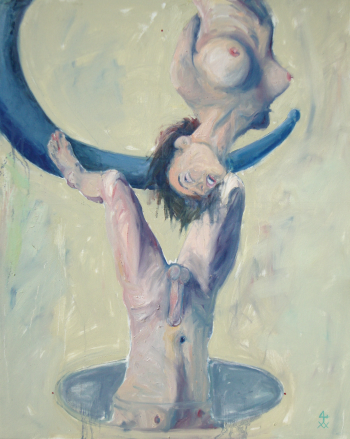

"Garden of Earthly Delights"
(detail) by Heironymus Bosch
Eros and Psyche
We know the story of Eros and Psyche through a story inserted in the Latin novel, “The Golden Ass,” by Apuleius of Madaurus (c. 125 – c. 180). The story is essentially a hero’s journey inside a hero’s journey. Socrates said the name heros is only a slight alteration of Eros, “from whom the heroes sprang.”(1) No one knows the origin of the Eros and Psyche story, adding to its archetypal mystique. Scholars do know that Apuleius’s version is an adaptation of an earlier Greek rendition. The name Psyche is an echo of the Babylonian ‘Zikia’ or ‘Ziki’, meaning ‘Life of Earth and Water.’ The word Psyche (saɪki) is the Greek: "Soul" or "Breath of Life." The word Psyche in Greek is also the word for butterfly, representing transformation and metamorphoses. The word Cupid in Latin is Cupido or "Desire" or Amor ("Love") as in the Greek word “Eros.”
Plato describes Eros as the heavenly kind of spiritual love, but in “The Golden Ass,” he is young, immature, rash, evil mannered, with fire and arrows. If Psyche represents the spiritual essence of our soul or the animating spirit of our soul having an earthly experience, then Eros is the active energy of our mind, which reacts to will and desire. Eros, in his immature state, is concerned with the physical kind of love, thereby falling in love with Psyche in secret from his mother (Venus). Hence, Eros represents the unconscious desires we pursue without the guide of spiritual essence.
The transformative process, as myths inform us, takes place within the human being having an earthly experience. It is the hero journey of the butterfly emerging from the dark chrysalis into the light. We begin the journey by allowing our unconscious to guide us into heart-consciousness. We begin loving the beauty in people and then learning to love the beauty that is unseen, the beauty of the soul.
In the painting, “Eros and Psyche” (2013), Eros is seen diving headfirst into matter, excited by the prospects of the senses. He seduces Psyche, who loyally follows him without expectation, but out of a sense of duty or obligation—the reason her hands appear to be tied behind her back. In this sense, it was matter that first seduced spirit, but we immediately discover a paradox because the creative force behind matter is spirit. Perhaps, then, it was the will and desire of spirit that created matter and not matter seducing spirit. In “The Golden Ass” version, Psyche marries Eros without meeting him beforehand, and thereafter engages in passionate nightly lovemaking although forbidden to see his face (i.e., trusting in the unseen).
In the end, Psyche’s pure and unconditional love transformed the heart of Eros, but only after Venus had sent Psyche to the underworld, where she had fallen into a deathly sleep after opening Persephone’s Box of Beauty. The Box of Beauty was intended for Venus to supplement her vanity. Psyche’s own desires led her face-to-face with her dark side. This is the journey of the hero where pain and suffering have the power to motivate us to give up our jealousies, passions, attachments, narcissism, our perceived failures, and self-loathing. Together, Psyche and Eros were forced to face their own inner shadows, which led them to the discovery of their true and royal Self and ultimately to the Sacred Union—where matter and spirit transcend the duality of the elements and exist in the remembrance of merging the soul and heart.
1. Plato, Cratylus, 398 d.
